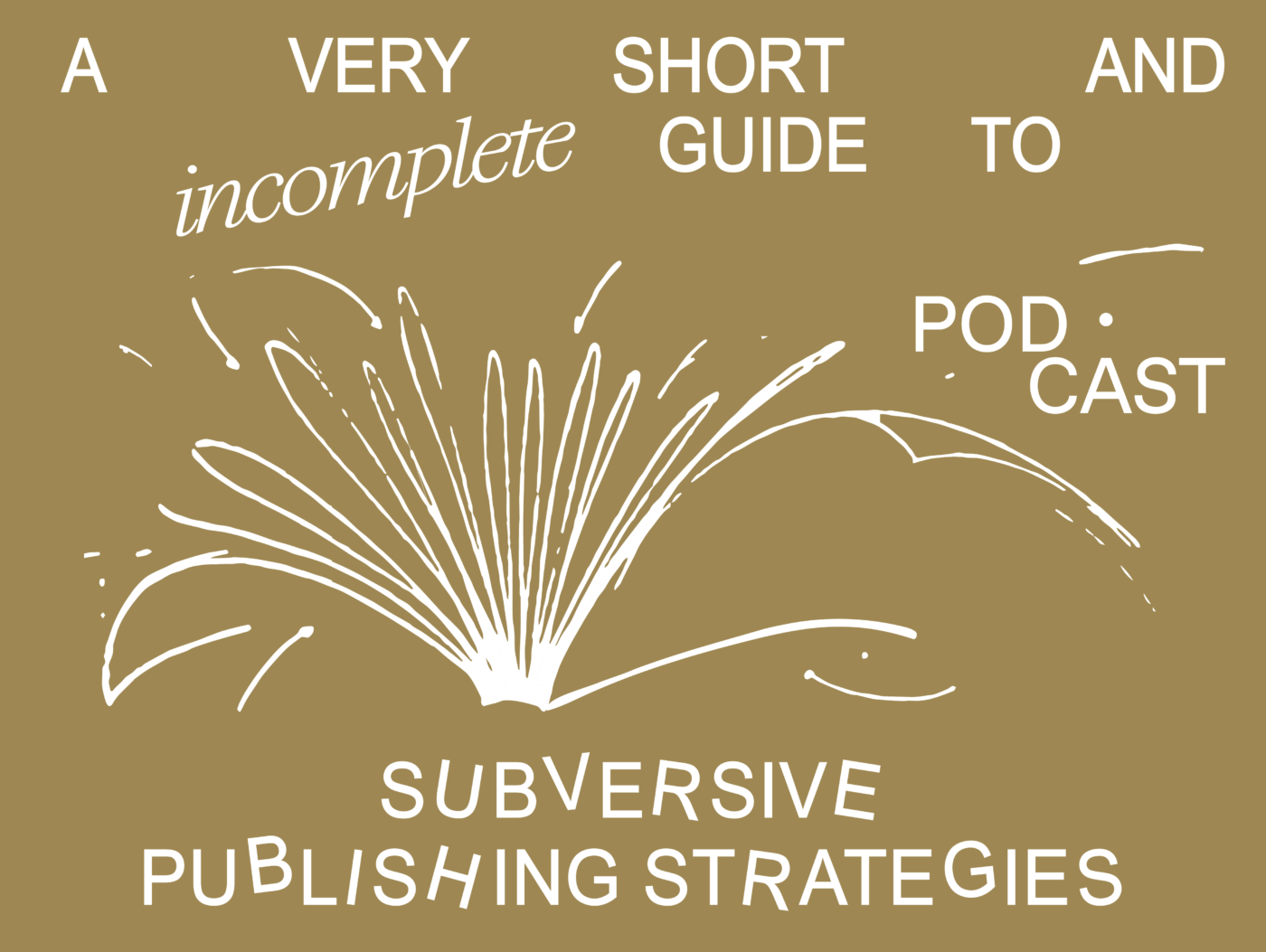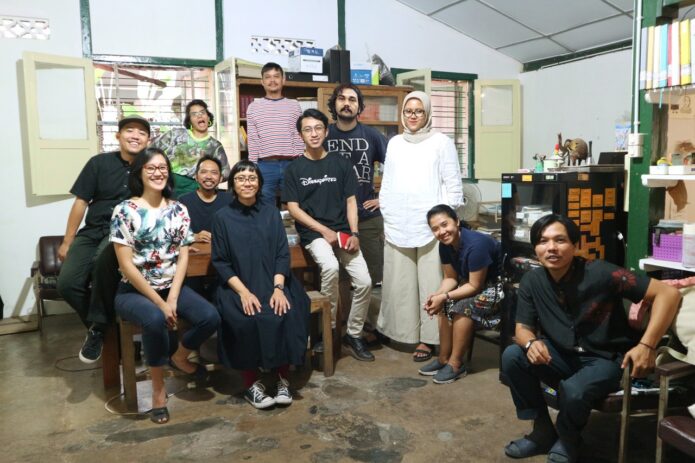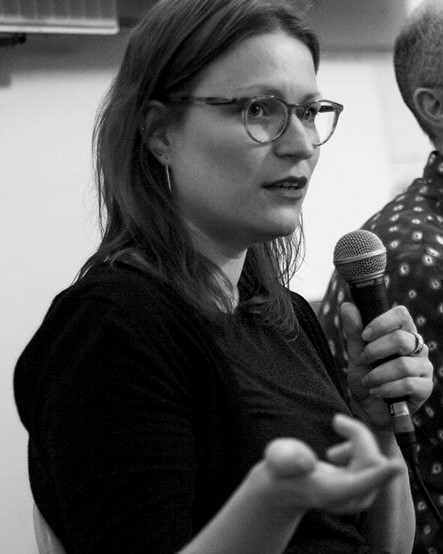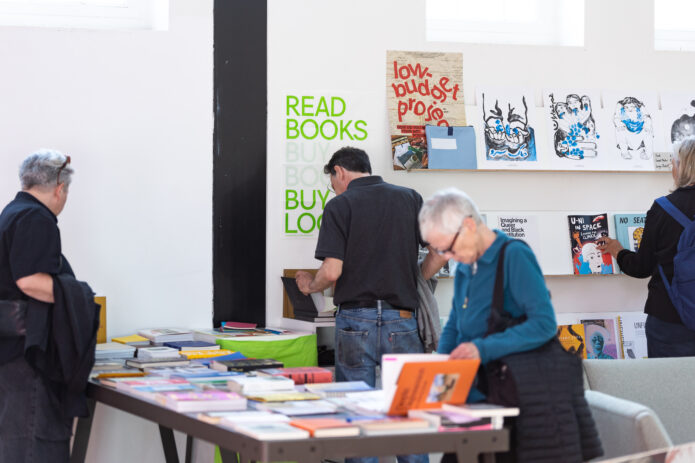 A Very Short and Incomplete Guide to Subversive Publishing Strategies (2023)
A Very Short and Incomplete Guide to Subversive Publishing Strategies (2023) Podcast: Subversive Publishing Strategies
Did you know Framer Framed has its own podcast? From interviews with artists and collectives to critical reflections of our programming, we are building a new collection of sound bites which offer a behind-the-scenes look at the exhibitions, curators, events, archives and more.
Irene de Craen has conducted a series of interviews on the Framer Framed podcast in connection with A Very Short and Incomplete Guide to Subversive Publishing Strategies. Read the introduction below and listen to the podcast series!
You can purchase a copy of the publication through our webshop!
Text by: Irene de Craen
I love books. I love letting my eyes glide along rows or piles of them inside bookstores, seeing old friends and new authors writing about topics I’ve never even considered (but am dying to know about now!). I love buying books. To take them home, hold them in my hands to feel their weight and texture, smell them, decide which to read first and which to carefully add to my affectionately organised collection. I love reading. Being transported to different worlds and thoughts that unsettle my own, or slowly leaf through a picture book while my mind is racing a million miles an hour. It is no wonder that I also love making books. Making what I feel is lacking, what I would like to read myself. To think about paper, the feeling of the object, the relation between text and image. Being somewhat part of the publishing world – at least in that very niche corner of cultural/art/experimental publishing – I feel part of a community of people who all feel that way, more or less. We have to. Because in many ways, publishing doesn’t make any sense. The most glaring obstacle is that it is virtually impossible to make a living from it. From the writers, to the publishers, to the sellers: no one gets rich. Maybe the distributors are, but not from our kinds of books and other assorted printed matter, that’s for sure. Then there is the extremely labour-intensive process (it’s always more work than you think, no matter how often you’ve done it!), the strain on the environment paper, ink and distribution have. And after all that? Every bookmaker knows that in most cases, they’re left with quite a few copies in their storage, always more than anticipated.
But there is more to it that makes this labour of love very problematic at times. Especially when one is interested in addressing and dismantling the colonial, capitalist, and patriarchal structures in our societies, one quickly realises that in publishing it is not enough to do this through the content of our material alone. Who gets to speak in our printed material is the first obvious point of attention. The lack of payment available for writers – to name but one aspect – favours those who have other sources of income, and excludes those already excluded. The same applies to language. English is the most widely spoken language in the world, and it is arguably essential for partaking in the art ‘world’. But English is a colonial language, not available to all, and if our goal is to be truly international, diverse, inclusive, and accessible, how do we address this? The fact is that publishing as we know it is very much a Western/ Global North dominated activity, that additionally is historically based on the exclusion of women. The academic side of publishing, the very premise of ‘knowledge production’, is built on the solid institution of ‘white men’.¹ In fact, it turns out all facets of publishing are deeply rooted in colonial, patriarchal and capitalist structures. No surprises there of course, why would publishing be any different?
Still, there is quite a contradiction between these structures and the people who – at least in my little niche corner – do the publishing, as well as the topics we aim to address. Ever since I started thinking about directing my professional activities towards publishing, I’ve been trying to pick these things apart. While doing so – sometimes successfully, often less so – I keep encountering more contradictions, and more questions to which I have no answer. Nonetheless, I do really enjoy the world of independent publishing, and I am definitely not the only or first person to ask these questions. In fact, I’ve had so many conversations about it, it made me think I could probably put together a guide on it that can serve as both a record of conversations had, as well as a starting point for those to come.
I could have been very trendy and called this a guide to ‘decolonial publishing’. But to me, subverting encompasses that, and more. What I particularly like about the concept of ‘subverting’ is that it can ‘undermine the power and authority of an established system or institution’ (says the Oxford Dictionary) almost without noticing. As you will see, many of the strategies covered in this little publication are things we do behind the scenes. Considerations we make regarding the way we organise our offices, what images we (do not) use and why, or why not to publish at all. Many of these strategies will never be apparent to a reader, but they are essential to the questions we ask, the work we do, and the published material we put into the world. So, this is not another book that fetishises printed material – albeit you can see from this introduction that I am very much such a fetishist.
To get the conversation going, I had – well – a series of seven conversations with independent publishers and collectives in Mexico, Uruguay, Indonesia, Paris, Paris/Beirut, Berlin/ Dakar/Milan and Lubumbashi, which were subsequently turned into a limited podcast series. I am eternally grateful for the people who gifted their time to talk openly about the ways they’ve approached publishing over the years. Each conversation was based on a strong conviction that sharing, collectivity, and accessibility are essential aspects for the kind of publishing world we envision together. In order not to limit ourselves to a notion of publishing that is printed matter on paper – something we return to several times in these pages – we have included QR codes to the full-length interviews which form the basis of this modest investigation and which can be listened to on various podcast platforms. For the printed part of this project, I have cut out and pasted fragments of these conversations; both mixing them into a larger discussion, as well as a way to draw out some very specific and useful strategies and thoughts. It is the type of cutting and pasting we know from zines: arguably the ultimate intimate, collective form of subversive publishing, historically associated with struggles for social justice. It is a form that enables to break the linearity of text, allowing for a kind of jumping to and fro, and free association between views and facts, allowing a reader to find additional meaning in the spaces in-between. Additionally, it is a practise that is particularly accessible as well as joyful to do.
I hope that this Very Short and Incomplete Guide to Subverting Publishing Strategies is helpful to individuals, collectives or cultural institutions that have or are considering publishing practices but are struggling with some of the contradictions within them. Those of us who are already up to our necks in this particular subculture – if one can call it that – you’ll probably recognise some of the questions and dilemmas tackled and can rest assured that you are not alone. In any case, this modest publication is a starting point to a conversation. One that I am particularly looking forward to continuing.
Irene de Craen
Berlin, March 2023
¹ Ahmed, Sara. ‘White Men’ Feminist Killjoy Blog (2014).
The 8-part podcast series, Subversive Publishing Strategies will be broadcast on Radio Alhara on the 3rd Wednesday of each month, starting 17 May 2023.
A Very Short and Incomplete Guide to Subversive Publishing Strategies (2023) was commissioned by Framer Framed in Amsterdam as part of the project The New Social. Hybrid Strategies for Cultural Spaces with support from Stimuleringsfonds.
Podcast / Subversive Publishing /
Network

KUNCI Study Forum & Collective

